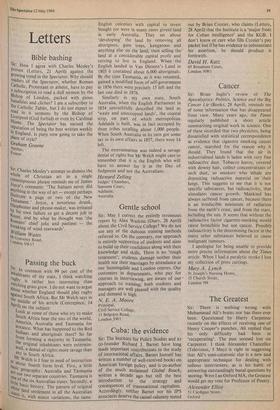Passing the buck
Sir: In common with 99 per cent of the tilhabitants of my state, I think watching rugby is rather less interesting than watching grass grow. I do not want to argue about whether England should play rugby against South Africa. But Mr Welch says in the .middle of his article (Centrepiece, 14 April) on the subject: Look at some of those who try to make South Africa bear the sins of the world, America, Australia and Tasmania for instance. What has happened to the Red Indians and aboriginals there? So far from forming a majority in Tasmania, the original inhabitants were extermin- ated, a denial of rights more savage than any in South Africa. , Mr Welch is I fear in need of instruction at about fourth form level. First, a little sic geography. Australia and Tasmania are not two separate countries. Tasmania is p.''e of the six Australian states. Secondly, a basic history. The pattern of original white land settlement in all the Australian with minor variations, the same.
English colonists with capital to invest bought (or were in many cases given) land in early Australia. They set about `developing' the land by removing all aborigines, gum trees, kangaroos and anything else on the land, then selling the land at a considerable capital profit and retiring to live in England. When the English landed in Van Diemen's Land in 1803 it contained about 6,000 aboriginals. By the time Tasmania, as it was renamed, gained a modified form of self-government in 1856 there were precisely 15 left and the last one died in 1876.
Similarly in my own state, South Australia, when the English Parliament in 1834 untruthfully described the land as `waste and unoccupied lands', the coastal strip, on part of which metropolitan Adelaide is built, was in fact occupied by three tribes totalling about 1,000 people. When South Australia in its turn got some say in its own affairs in 1857, there were 14 left.
The extermination was indeed a savage denial of rights but Mr Welch might care to remember that it is the English who will have to answer for it at the Day of Judgment and not the Australians.
Howard Zelling
Judges' Chambers, Supreme Court, Adelaide, Australia






































 Previous page
Previous page